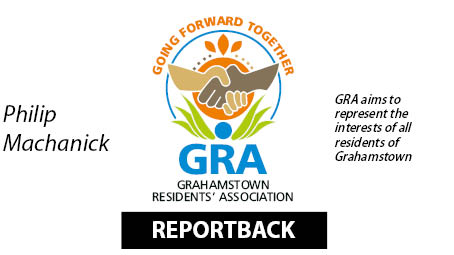Water and power failures
Over the last week we have reported numerous incidents of power failure and water outages.
In general, what happens is that the first outage cascades, causing others. For example, when much of town was out of electricity, the problem was isolated and solved. Then when power was turned back on, an underground cable in Market Street blew because the aged insulation failed under the extra load.
Possibly something similar is happening with water – when a leak is fixed, turning the pressure back on causes failures of other weak points.
We are doing our best to keep residents informed but the Municipality needs to work on its communication. In some instances we have only been able to find out what happened by going to the place where the work is going on and asking those doing the job.
State of finance
One of the big obstacles to getting the municipality under control was a court action over the appointment of a municipal manager that precluded a permanent appointment. Paul Notyawa was the leading candidate in the 2015 process but when provincial government refused to concur on his appointment, he challenged this in court. Appointing an acting MM for 3 months at a time cannot address long-term problems. With the dismissal of Paul Notyawa’s case (reported on 26 August), the possibility is opened up for making a permanent appointment. We remain pessimistic that this is sufficient and continue to support the ongoing call from the group we joined, Concerned Citizens Committee to Save Makana (CCCSM), for Province to second a competent manger with turnaround skills. Ongoing problems include unsustainable cash flow, inadequate consequence management, lack of morale and inconsistent standards of work – sometimes very good but, too often, substandard.
Another wrinkle on municipal finance
On 1 November 2016, GRA hosted a meeting on municipal finance at which REVCO, contracted to assist with debt collection, gave a presentation. One of the more surprising claims was that municipalities are entitled to claim debt arrears incurred by a previous owner from the current owner of a property.
At the time, this seemed to us a strange provision, as part of the transaction of transferring ownership is a rates clearance certificate. If a municipality issues this and the new owner is subsequently held liable for a debt of which they had no knowledge on concluding the purchase, how could this be fair and reasonable?
This question has subsequently been challenged in court. On 28 August 2017, the Constitutional Court confirmed a finding by the North Gauteng High Court that debt could not be passed through transfer of ownership.
Does this mean that municipalities now cannot recover historic debt if a property is
sold? No. The municipality still has the option to refuse to allow a transfer pending
debt payment and to take action against a previous owner.
The critical part of the judgement is:
It is declared that, upon transfer of a property, a new owner is not liable for
debts arising before transfer from the charge upon the property under section
118(3) of the Local Government: Municipal Systems Act 32 of 2000.
The whole judgement makes interesting reading and points to how municipalities
ought to conduct their finances and recover debt. You can find the text here:
http://www.saflii.org/za/cases/ZACC/2017/31.pdf
Keeping up
If you want to keep up, follow us on Facebook or – better still – sign up as a member.
Strength in numbers helps us when we work with municipality and provincial
government. If you use WhatsApp, you may also have the option to join up with a
local neighbourhood group (for example, in Sunnyside).
–Compiled by Philip Machanick, GRA Chair
Facebook: https://www.facebook.com/GrahamstownResidentsAssociation
email: info@grahamstownresidentsassociation.co.za
phone: 078 922 5760
web: www.grahamstownresidentsassociation.co.za



